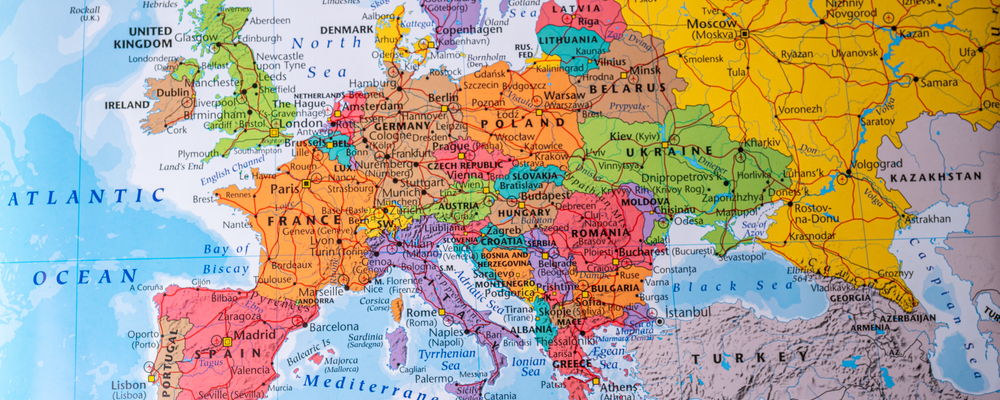Defense & Security
Inside out: Europe’s accidental empire builders

Image Source : Stutterstock
Subscribe to our weekly newsletters for free
If you want to subscribe to World & New World Newsletter, please enter
your e-mail
Defense & Security

Image Source : Stutterstock
First Published in: Jul.03,2023
Aug.24, 2023
In the late 19th century, geopolitical thought developed in two steps. First, individual European empires, anxious about their hold over the Eurasian and African land mass, began to codify competitive geostrategies based on their past struggles with one another. Second, the United States (US) took up the most relevant strand of this thinking, from the United Kingdom (UK), and reimagined itself as a global sea power, capable of spreading liberal maritime values such as free exchange worldwide.
These two generations of geopolitics have come home again, brought back to Europe by a well-meaning Joe Biden, the US President. When Biden chose Germany as his key geopolitical partner on the other side of the Atlantic, Europe inexorably began reconfiguring itself according to these two theories. Biden’s choice of Berlin as partner turned Central Europe into a captive fringe for Germany, which in turn spurred a liberal European seaboard to take shape, from the Baltics to Italy.
At the start of his presidency, Biden identified Germany as his key partner in a coming geoeconomic grudge-match with the People’s Republic of China (PRC). With his decision to lift Nord Stream II sanctions Biden was rewarding Europe’s biggest economy and most stable democracy. He was also signalling that Germany must finally take geopolitical responsibility after 30 years of free-riding.
Biden’s choice, logical and well-meaning, has triggered a chain reaction in Europe.
Geopolitik is taboo in Germany. So how to respond when the guardian of the open international order pressures you to become geopolitical? The answer is by constitutional means – bind Germany into a federal European state by lifting the right of European Union (EU) governments to veto joint foreign policies. For officials in Berlin, this is the obvious way to harness German power in Europe – so obvious that it does not cross minds that others see things differently.
Poles see things differently. They believe federalisation, far from harnessing German power, would cement German dominance of Europe. They do not fear a geopolitical Germany, just so long as it is their kind of geopolitical: they want a Germany that stands up to Russia. But until there is proof that Germany is ready to do so, why commit to federalisation?
The German Government responds by claiming its agenda to federalise EU decision-making is all about standing up to Russia – Olaf Scholz, the German Chancellor, wants assertively to enlarge the EU eastwards, and to do so he must first streamline policy making so that the EU still functions when the Moldovans or Montenegrins are sitting around the table. But the Poles say enlarge the EU first, before reforming it.
Poland wants a ‘geopolitical eastern enlargement’ not a process-driven one: the Polish Government wants to expand the EU quickly into the old ‘crunch zone’ between Russia and Western Europe to protect and reward the Ukrainians’ defence of European values. And it wants to do this before federalisation, to hedge against Berlin gaining power over common European decisions and putting EU enlargement on ice in deference to Moscow.
France, meanwhile, hears these conversations and fears that Germany is losing its recent Westbindung – that it is tilting back towards its historical centre of gravity in the East. This would mark the end of the EU as a Mediterranean project. Panicked by this prospect, the French propose a Europe of ‘concentric circles’.
This is the notion of Emmanuel Macron, President of France, that an EU of 36 will have to be led by a sub-group of states. The original six western EU states would be at the political and economic core by dint of the fact that easterners like Poland are still not part of influential clubs like the eurozone.
These countries are re-enacting historical fears. Geopolitical thinking is hard-wired into European strategic culture, and Germany, Poland and France fall easily into the tropes of late imperial anxiety. Poland fears again being in a crunch zone between Russian and German condominiums. France fears the loss of its old African sphere of influence. And Germany is afraid of others seeing Europe as its empire.
The tragedy of European geopolitics, moreover, is that it is built on historical fears that become self-fulfilling. Combined, these three ideas – ‘European federalisation’, ‘concentric circles’ and ‘geopolitical enlargement’ – formalise unfair political hierarchies in Europe and cement what all fear most – German dominance.
By federalising the EU, Berlin is unwittingly cementing its own position at the top of the European pecking order. It is constitutionalising Europe along very German lines.
The French are aware that Germany is cementing these power hierarchies, but they cling to the belief that they can benefit – that Paris and the original EU states will join Berlin in the inner circle of European affairs. But the French-German relationship has shattered, and Germany now sits alone in the inner circle. So when the French promote the notion of ‘concentric circles’ they legitimise only their own downgrade.
Tellingly, other founding EU members – Belgium, Luxembourg and Italy – are embracing life in the second tier. During the pandemic, when hit by German border closures, Italy teamed up with neighbouring Bavaria, Luxembourg with Rhineland Palatinate, Belgium with North Rhine Westphalia. These EU members now routinely behave as if they were themselves German Laender and the German federal order were Europe’s.
As for Warsaw’s notion of ‘geopolitical enlargement’, it in effect relegates Poland and its closest partners to a third or fourth tier. Poland argues that reform of voting procedures should be delayed until after Ukraine and the nine other potential members have joined the EU – implying that new members will renounce their voting rights whilst the EU reforms. In so doing Poland is legitimising precisely what it has complained of for years – the way new states are treated as mute ‘policy-takers’ by Germany long after they join.
Poland’s idea of ‘geopolitical enlargement’ also risks relegating non-EU members like Britain and Norway to the political fringes even as they try to partner with the EU in Ukraine and Eastern Europe: Poland is trying to motivate Germany to enlarge the EU eastwards with the narrative about the need to compete with ‘third powers’ and contain their influence. But, unwittingly, this lumps Britain and Norway in with the PRC and Russia, making them interlopers in their own backyard.
A Berlin-centric European order need not be oppressive for countries in its outer tiers, so long as Germany is responsive and shows moderation. But Scholz does not easily budge. His Germany is mired in angst about its manufacturing prowess, and has little room for others’ concerns.
Berlin, faced with demands across Europe for German action and cash, is experiencing a kind of imperial fatigue. Officials not only speak of EU enlargement as a kind of overstretch. They describe the big dossiers in pessimistic, Malthusian terms – digital connectivity in terms of ‘shrinking space’, migration in terms of ‘global overpopulation’, climate transition as a ‘scramble for rare resources’.
This pessimistic Germany too often uses its centrality to protect and enforce the unsustainable European status quo. Instead of radically overhauling Europe’s energy infrastructure during the recent gas crisis, for instance, Berlin announced that it expected southern EU states to give Germany their gas stocks. The bottom line: give us your gas or we will give you our economic recession.
Germany, remember, did not undergo the usual pattern of de-industrialisation over the last 30 years. Instead, it kept its manufacturing sector afloat by squeezing value from Europe’s political and economic infrastructure. This is still the easiest option even if that infrastructure today has little to give.
Its neighbours, however, are not yet ready to accept their fate as Germany’s captive fringe. Their fear that Scholz’s Berlin may be adopting a Germany First approach is triggering a remarkable reshuffling of alliances in Europe, as reformist states try to coalesce against Berlin. The Netherlands and France, historically at odds over economic policy, are teaming up. Even more surprisingly France and Poland, so angered by the German stance on nuclear power, are aligning on a cautious selection of strategic matters.
This possible shift of power away from Germany has somehow been missed. True, there has been a lot of talk about a shift of power eastwards in the EU, towards Central Europe, but most commentators agree that this will amount to little given Poland’s divisive domestic politics. Far more interesting and vital is the shift of power westwards, as Germany tries to rewire its critical infrastructure so that energy, investment capital and ideas flow into its ailing economy from the west, not east.
Simple geography makes seaboard states like the Netherlands or Italy access points for resources heading to Germany from the Americas and Africa.
Europe’s seaboard states are alive to the opportunities this shift creates. Italy has revived plans from the 1950s to become an energy hub between Africa and Europe. The British with their long coastline can act as a supplier of wind energy and a dock for liquid natural gas to Europe. The Dutch, having established their ports as a main disembarkation point for US troops and arms, can influence infrastructure decisions across the continent.
Coastal states that until recently were split north-south are teaming up under a shared appreciation of their dynamic outward-looking approach. Italy has reportedly invited the Netherlands to ‘push’ it into deregulating its economy on a mutual job creation drive. The Netherlands has encouraged Italy’s highly-educated population to move northwards. Spain has hinted that Dutch farmers might relocate southwards. France and the UK are making available their finance hubs. The Baltics their technology.
These coastal states are, moreover, trying to offer a pontoon to Central and Eastern Europe, connecting it to the Atlantic seaboard. Britain, for instance, has already reached out to Nordic and Baltic states through the UK-led Joint Expeditionary Force, and there are discussions about bringing it to Poland and Ukraine. Germany, previously the superconnector at the heart of Europe, is allowing itself to be bypassed.
Importantly, countries like Denmark or the Netherlands never viewed the EU in terms of state-building, as in Berlin, where each European crisis is an opportunity for deepening integration and ratcheting the EU forward towards federalisation. They treat it as a kind of sandbox or plug-in: the EU is a means of reinventing order in Europe, responding to big geopolitical shifts with a handy toolbox of markets and inventive governance.
Today the big geopolitical task is to protect states threatened by the rise of the PRC, and ensure mutual access to critical resources and investment capital. Many of those threatened are seaboard states in the Indo-Pacific. The EU has its role to play, and if it were true to this sandbox spirit, it would today be sacrificing sacred cows from the 1990s and raiding old EU projects like the Eurozone to combine cheap and reliable energy, foundational technology, pockets of investment capital and access to the best minds.
But if a German-led EU is not prepared to revive this inventive spirit and pick and mix across old projects – mixing the Capital Markets Union with Green industry and so on – these seaboard countries will use their own shared attributes to turn Europe inside-out.
First published in :

Dr. Roderick Parkes heads the Alfred von Oppenheim Center on the Future of Europe at the German Council on Foreign Relations (DGAP) in Berlin. A British national, he has held senior research positions in government-affiliated think tanks in Paris, Brussels, Warsaw, Stockholm, and Berlin over the past 20 years. He focuses on European security.
Unlock articles by signing up or logging in.
Become a member for unrestricted reading!